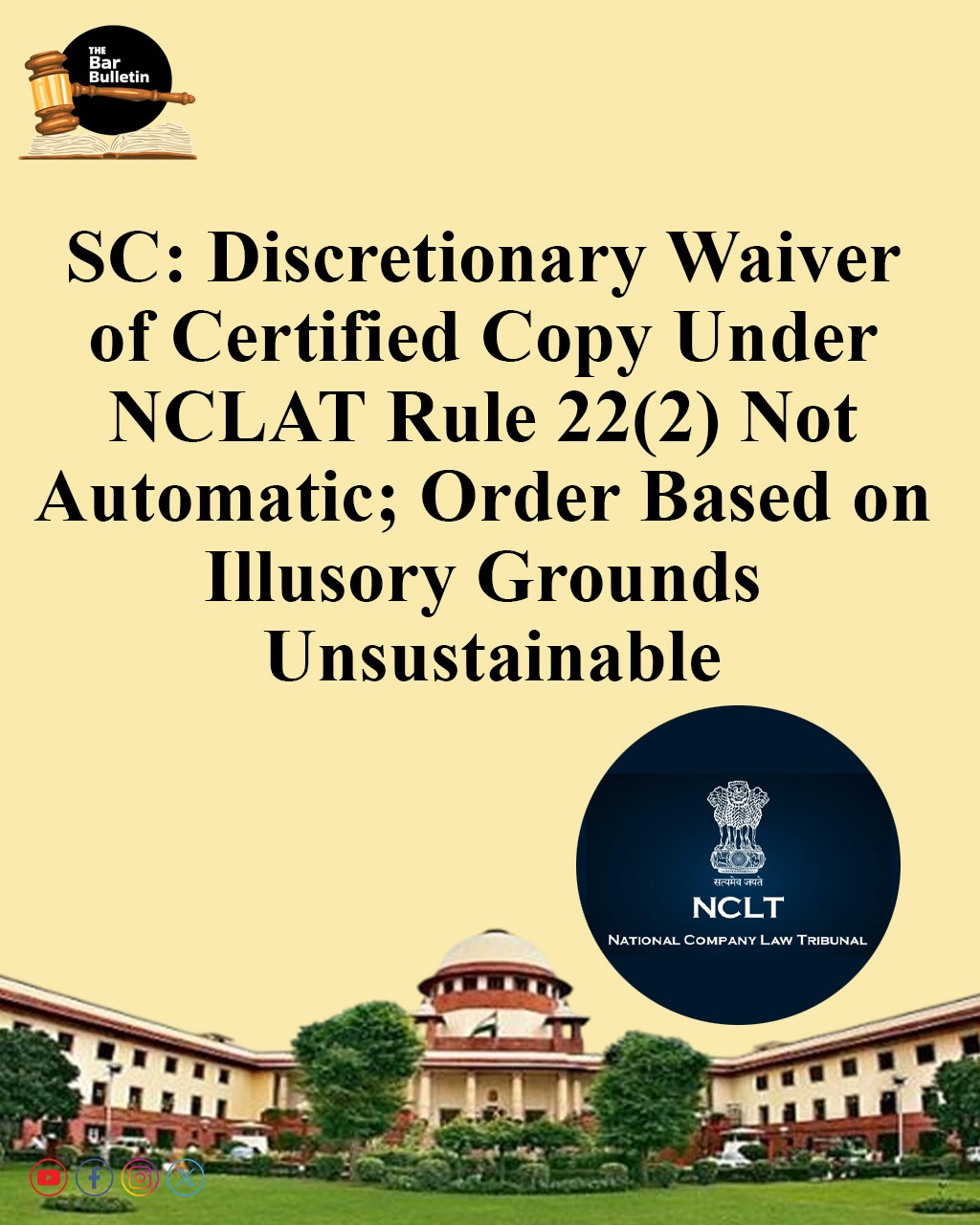Referring to a decision of its Coordinate Bench in the case of A Rajendra vs. Gonugunta Madhusudhan Rao [2025 INSC 447], the Supreme Court yesterday observed that the incident that triggers the limitation to commence is the date of pronouncement of the order, and in a case of non-pronouncement of the order, when the hearing concludes, the date on which the order is pronounced or uploaded on the website. The Court also clarified that though the National Company Law Appellate Tribunal (NCLAT) is clothed with the powers to exempt time under Rules 14 and 15 of the NCLAT Rules, such powers cannot be exercised so as to render Rule 22(2) thereof nugatory.
The Division Bench comprising Justice Sanjay Kumar and Justice Satish Chandra Sharma reiterated that a discretionary waiver from Rule 22(2) of the NCLAT Rules, which mandates the certified copy being annexed to an appeal, does not act as an automatic exception where litigants make no efforts to pursue a timely resolution of their grievance. The Bench cautioned that the exemption cannot be to the extent of completely dispensing with the filing of a certified copy, which would annihilate the clear mandate of Rule 22(2) of the NCLAT Rules, which categorically uses the word ‘shall’ to emphasize that an appeal must be accompanied by a certified copy of the order impugned.
The Bench added that the statute peremptorily requires proper institution of an appeal in conformity with all the prescribed norms, and it was incumbent upon the NCLAT to examine and verify as to whether the appeal was in due compliance with all such norms. Since a certified copy of the impugned order was filed belatedly without even filing a condonation application or without even seeking an exemption from the same, and the NCLAT had completely brushed aside this crucial aspect, the Bench concluded that the judgment delivered by the NCLAT on merits is essentially a superstructure erected on an illusory foundation and cannot, therefore, be sustained. Hence, the Bench allowed the appeal.
Reference was made to the decision in the case of V. Nagarajan v. SKS Ispat & Power Ltd. and others [(2022) 2 SCC 244], wherein it was observed that “when timelines are placed even on legal proceedings, reading in the requirement of an “order being made available” under a general enactment (Companies Act) would do violence to the special provisions enacted under IBC where timing is critical for the workability of the mechanism, health of the economy, recovery rate of lenders and valuation of the corporate debtor. IBC, as a prescriptive mechanism affecting the rights of stakeholders who are not necessarily parties to the proceedings, mandates diligence on the part of applicants who are aggrieved by the outcome of their litigation. An appeal, if considered necessary and expedient by an aggrieved party, is expected to be filed forthwith without awaiting a free copy, which may be received at an indefinite stage. Hence, the omission of the words “from the date on which the order is made available” for the purposes of computation of limitation in Section 61(2) IBC, is a consistent signal of the intention of the legislature to nudge the parties to be proactive and facilitate timely resolution.”
The Bench also reiterated that, though a waiver on filing an appeal without a certified copy is often granted for the purpose of judicial determination, it does not confer an automatic right on an applicant to dispense with compliance so as to render Rule 22(2) of the NCLAT Rules nugatory. Thus, the act of applying a certified copy is not just a technical requirement for the computation of limitation but also an indication of the diligence of the aggrieved party pursuing the litigation in a timely fashion.
In this case, an Insolvency petition was filed by DSK Global Education and Research (1st Respondent) assailing the validity of the order passed by the NCLT, whereby the interlocutory application filed by the Resolution Professional was allowed, and the resolution plan submitted by the successful resolution applicant, Ashdan Properties Private Limited (Appellant) was approved. Essentially, an argument was raised before the NCLAT that the appeal was barred by limitation as it was filed beyond the statutorily prescribed period. However, without dealing with the issue of limitation insofar as the filing of the respondent’s appeal was concerned, the NCLAT disposed of the case. Since the e-filing of the respondent’s appeal was defective, not only because there was a delay in its filing but also because no application was filed for condonation of such delay, and secondly, the appeal was filed without a certified copy of the impugned order without seeking exemption from filing such a certified copy.
Cases Relied On:
V. Nagarajan v. SKS Ispat & Power Ltd. and others [(2022) 2 SCC 244]
A Rajendra vs. Gonugunta Madhusudhan Rao [2025 INSC 447]
Appearances:
Advocate Preetika Dwivedi, for the Petitioner
Advocate Soayib Qureshi, for the Respondent

